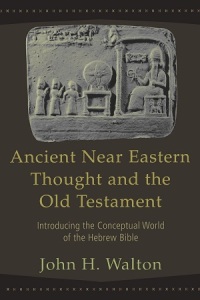 John Walton’s Ancient Near Eastern Thought and the Old Testament
John Walton’s Ancient Near Eastern Thought and the Old Testament is an introductory look comparing the thought and worldview of ancient near eastern societies (Egyptians, Mesopotamian, etc.) to the worldview of the Bible. Walton does an incredible job relating the two together in such a way as to neither trivialize nor lionize ANE thought and its use in interpreting the Bible.
The book is chock full of quotations from various documents from the ANE set alongside each other with comparative insight from Walton. It is organized in such a way that ANE thought is analyzed in regards to religion, cosmos, and people, with subdivisions of each. Throughout the text there are sidebars comparing what is being studied to the Old Testament, thus revealing many insights into the meaning of key OT texts. Walton’s approach is even-handed and fair.
I’d honestly say this might be the most interesting scholarly book I’ve read. I cannot recommend it highly enough.
Links
Be sure to check out the page for this site on Facebook and Twitter for discussion of posts, links to other pages of interest, random talk about theology/philosophy/apologetics/movies and more!
Source
John Walton, Ancient Near Eastern Thought and the Old Testament (Grand Rapids, MI: Baker, 2006).
SDG.
——
The preceding post is the property of J.W. Wartick (apart from quotations, which are the property of their respective owners, and works of art as credited; images are often freely available to the public and J.W. Wartick makes no claims of owning rights to the images unless he makes that explicit) and should not be reproduced in part or in whole without the expressed consent of the author. All content on this site is the property of J.W. Wartick and is made available for individual and personal usage. If you cite from these documents, whether for personal or professional purposes, please give appropriate citation with both the name of the author (J.W. Wartick) and a link to the original URL. If you’d like to repost a post, you may do so, provided you show less than half of the original post on your own site and link to the original post for the rest. You must also appropriately cite the post as noted above. This blog is protected by Creative Commons licensing. By viewing any part of this site, you are agreeing to this usage policy.

Just a ditto to your comments. I had read many descriptions of ANE literature before but when I read Walton’s book my eyes were really opened to how valuable that literature can be for providing insights into the woldview of the day. I especially liked the side note applications to the Bible sprinkled throughout. The ones on the tower of Babel and Joshua’s long day were especially useful. Joel
Posted by Natural Historian | October 22, 2014, 7:29 AMThanks for the suggestion! I have read most of Walton’s The Lost World of Genesis One: Ancient Cosmology and the Origins Debate, and quite enjoyed it. I had the privilege of recently attending a “Bible Q&A” where he took questions from the audience; he said some really neat stuff. One of them is that God never cared about the particular structure of a society, in comparison to (a) there being right relationship, including justice; (b) there being individual excellence of character. Likewise, in the NT, we see this pattern and not The One Template to Rule Them All for church structure. People often forget how few laws the OT actually has!
My one criticism of Walton is that he really, really needs to steep himself in teleology. He discusses how the ancient Hebrews had a “functional ontology” and therefore that Genesis 1–11 needs to be read in this way. I talked to him before the above Q&A session and asked him whether he had looked into the connections between functional ontology and teleology. He said no, but that he has his son to ask for philosophy questions. That’s fine, but I think he could do some powerful stuff by digging into teleology. The Enlightenment put a nail in the coffin of teleology (nominalism probably put another nail; thanks William of Ockham!), and I think we’re suffering terribly as a result. Suggested reading: Alasdair MacIntyre’s After Virtue, Louis Dupré’s Passage to Modernity: An Essay in the Hermeneutics of Nature and Culture, Richard M. Weaver’s Ideas Have Consequences.
Posted by labreuer | October 22, 2014, 12:13 PMLet me chime in here too! I taught an adult Sunday class on “Lost World…” and I just enjoy Dr Walton’s scholarship.: This is really good stuff. I will have to get this book as well. Thanks J.W.
😉
Posted by Lisa Guinther | October 22, 2014, 9:11 PM